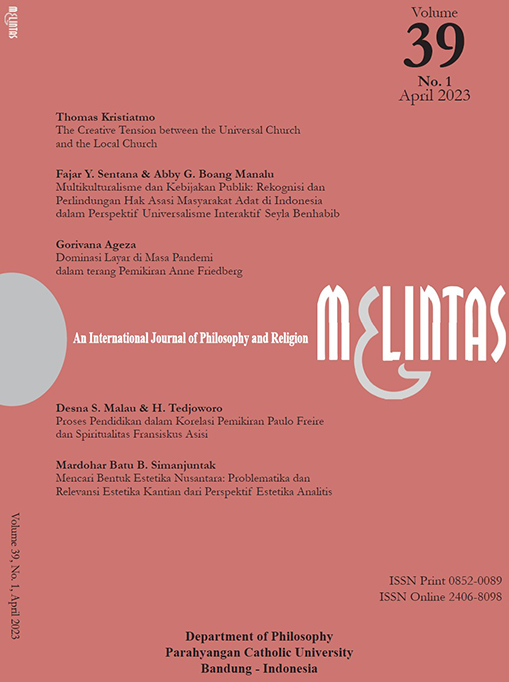Vol. 39 No. 1 (2023)

Identity tends to be lived in everyday life, and is not truly examined or questioned. Some people think that they already know who they are, and almost never trace when their identity was first seen clearly. In fact, can identity be defined? Defining identity is a matter of who a person wants to be, but discovering and seeing identity is a different matter that is not just (re)defining it. Identity becomes important when there is an ‘other’. At that moment we find out our identity because of that ‘other’. We do not define our identity, since it goes far beyond simply our desires. That is why the matter of who we are grows in relationship with others. We are ‘defined’ by a form of togetherness that has always been intrinsic to reality.
As individuals or as a group, we develop our identity in the relationships with others. We change and grow. This time Melintas will explore how and because of what circumstances our view of ourselves develops and is enriched by the (re)connections with others. Some ideas and perspectives might change who we are. The first article examines the creative tension between the universal Church and the local church. History has witnessed that sometimes there were tensions between the two and the solutions offered are oftentimes one-sided. The article deals with the tension by using creativity to explore new ways of constructing local theologies. The second article discusses the issue of recognition and protection of indigenous peoples’ rights in Indonesia in the light of Seyla Benhabib's interactive universalism. It analyses the challenges and opportunities by emphasising cultural diversity and the importance of the local context.. The third article sees how ‘screen’ allows humans to experience and understand the world without being limited by the existence of their physical body in the light of Anne Friedberg’s thoughts. It analyses the consequences of the massive virtual mobility and screen dominance since the outbreak of the Covid-19 pandemic. The fourth article explores how Paulo Freire’s philosophical thinking and the spirituality of Francis of Assisi can inspire the world of education, particularly in Indonesia. The philosophical concept of education is used as a rational framework for evaluating the educational process, and the spiritual inspiration provides a common vision to direct and enrich the atmosphere of education. The fifth article tries to find a common philosophical grounding for an Indonesian aesthetics by elaborating Immanuel Kant’s arguments. It takes an initiative to seek theoretical framework inspired by Kant’s implied position of the sublime for the artistic practices in the modern Indonesia.
The question of ‘who’ is linked to the countless complex layers in an everyday web of interrelationships. We always need others to discover who we are in the midst of this singular universe. Instead of imagining a fantastic yet confusing multiverse, it would be much more realistic if we pursued our role in the togetherness of all humanity in this beautiful world, right now.
Editor.

